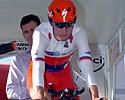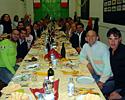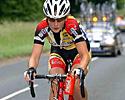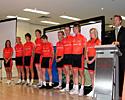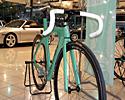First Edition Cycling News for October 20, 2005Edited by Jeff Jones UNESCO declares war on dopingAt its plenary session in Paris on Wednesday, the General Conference of UNESCO unanimously passed a treaty to combat drugs in sport. Officially named the "International Convention against Doping in Sport" (ICDS), the accord seeks to unify anti-doping efforts across all sports and UNESCO member states. However, for it to take effect, at least 30 UN member governments need to sign it, and even then, they would be the only countries bound by it. UNESCO hopes that it will be in effect before the next Winter Olympics in Turin, Italy in early 2006. "This is the first time a legal instrument aimed at eradicating doping is both binding and universal," said UNESCO in a statement. "A global response to a global problem, such is the challenge put to the new Convention. It supplies governments with a legal framework for an international harmonization of efforts in the fight against a scourge that flouts the ethical and social values of sport while putting the health of athletes at risk." The UNESCO statement also addressed the problem of doping in amateur sport and even among the general fitness crowd: "According to a European Commission study in 2002, nearly 6% of all clients of fitness centres in several European countries admitted to taking doping agents to enhance their performance. A survey by the University of Quebec discovered the same year that 26% of amateur athletes questioned had used substances banned by the Olympic Committee at least once in the last 12 months." The ICDS hopes to "go beyond testing and sanctions. It incites States Parties to 'undertake, within their means, to support, devise or implement education and training programs on anti-doping' in order to raise public awareness of the negative effects of doping on health and on the ethical values of sport, as well as provide information on the rights and responsibilities of athletes and on testing procedures. Signatories will also promote 'active participation by athletes and athlete support personnel in all facets of the anti-doping.'" The ICDS goes hand in hand with the World Anti-Doping Agency's World Anti-Doping Code, which was adopted in 2003. Signatories to the Convention will also be bound by the WADA code, but would also have a say in the approval of new lists of prohibited substances and methods. Another part of the ICDS will "facilitate the timely movement of duly authorised doping control teams across borders when conducting doping control activities. They also commit to promote cooperation between testing laboratories and to 'mutually recognise the doping control procedures and test results management, including the sport sanctions thereof, of any anti-doping organisation that are consistent with the Code.'" WADA has welcomed the adoption of the Convention with open arms. "The adoption of the Convention by UNESCO is a strong signal of the commitment of the governments of the world to the fight against doping in sport," said David Howman, WADA's Director General. "The drafting of this Convention in just two years was a world record for international treaties. We warmly commend and thank UNESCO for facilitating the process, and we look forward to the treaty coming into force and the ratification by each government before the opening day of the 2006 Winter Olympic Games in Turin." WADA further noted that, "Until now, many governments could not be legally bound by a non-governmental document such as the World Anti-Doping Code, the document harmonizing regulations regarding anti-doping in all sports and all countries of the world. Governments have accordingly, pursuant to the Code and with the assistance of WADA, drafted this International Convention under the auspices of UNESCO, the United Nations body responsible for education, science and culture." Currently, 181 countries have signed the WADA's Copenhagen Declaration on Anti-Doping in Sport (2003), and more than 570 sports organizations have already adopted the WADA Code. Sosenka aims for new hour record in 2007By Jean-François Quénet
Czech time trial champion Ondrej Sosenka didn't make a huge impact on the cycling world when he broke the hour record, because he chose to give it a go in Moscow, quite far away from the international media which was busy covering the Tour de France at the same time. But journalists might have another chance to become familiar with the 30 year-old giant from Prague. He'll be taken more seriously when he attempts it again. "To break the hour record has been the peak of my career so far, but I feel I can go over the magic barrier of 50 kilometres," he declared after winning the Chrono des Herbiers in France on Sunday ahead of no less than time trial world champion Michael Rogers. Sosenka scored 49.7 km in July this year, which is 259 metres more than Chris Boardman in Manchester in October 2000 and 269 metres more than Eddy Merckx in Mexico in October 1972, since the UCI has cancelled all the records broken because of modern positioning on the bike by Francesco Moser, Graeme Obree, Chris Boardman, Miguel Indurain and Tony Rominger consecutively. "I've worked for three months with a team of 10 persons assisting me full time for breaking the record," Sosenka explained. "But I can improve my technique. I have never studied my aerodynamics in a wind tunnel for example, which is something I'll do in Italy early next year. I don't think I'll try the record again too soon though, but it's in my mind for 2007." In 2006, Sosenka will ride on the road for Acqua e Sapone again. Calle gets her medalColombian cyclist Maria Luisa Calle, has received her bronze medal that she won in the women's points race at the 2004 Olympic Games. Calle's medal was under dispute after she tested positive for the stimulant Heptaminol in a post-race anti-doping control. But she successfully appealed against the IOC's decision to strip her of her medal and has now got it back from American Erin Mirabella, who finished fourth in the race. Liquigas celebrates
The Liquigas-Bianchi team celebrated its 'comeback' professional season at a party in Liquigas' head office in San Donà del Piave, Italy, on Tuesday evening. The team scored 19 victories in 2005, with the highlights being the Pro Tour, won by Danilo Di Luca, who also collected the Amstel Gold Race, Flèche Wallonne and the Vuelta a Paìs Vasco; the Italian national title won by Enrico Gasparotto, and the two sprint victories by Mario Cipollini at the beginning of the season. Managers, riders, technicians and the staff of the green-Celeste team gathered on Tuesday, together with team manager Roberto Amadio and the president and the managing director of Liquigas SpA, Paolo Zani and Paolo Dal Lago. During the party, Paolo Dal Lago thanked the team, saying, "We have been key players all the season long: our aim for 2006 is...getting even better." As for Danilo Di Luca, he gave all those present a DoGi jewel, one of his own sponsors, with "Pro Tour 2005" engraved on it. After the dinner, Enrico Gasparotto looked after the team and they then emptied a bar in the area's supply of champagne. Liquigas-Bianchi will race two more events in 2005: Firenze-Pistoia (October 22) with Di Luca, Gasparotto, Andriotto and Miorin, and on Saturday, October 29 in Newport, Magnus Bäckstedt will attempt the derny paced hour record. Davies on the improve
Top British cyclist Emma Davies is making good progress after her recent 'hit and run' accident. Emma has been fitted with a figure hugging spinal waistcoat and has started to take the first steps on her road to recovery. At this stage she is being closely monitored by her consultant Neurological Surgeon Mr James Leggate who together with Emma will make all the relevant decisions on her road back to the top. "I want to thank all the medical team who have been involved in my care," said Emma. "Especially Mr Simon Carley and Mr Phil Hirst of Manchester Royal Infirmary who were responsible for my immediate care following the accident. I know that I am in the best care possible with James Leggate but I have been greatly inspired by all the e-mails I have received and especially the one I got from Alexis (Rhodes) in Australia. The whole of British Cycling from the office staff right through to the coaches and medical staff have been fantastic and their support and planning to help get me back to the top keeps me very positive and very motivated. "The support that Emma is receiving is fantastic said her father John Davies. She is receiving regular calls from the team management at Vlaanderen-Capri Sonne and it is wonderful to know that everyone is behind her recovery. The hospital room is full to capacity with get well cards and we are taking up to 50 e-mails a day for her to read." Messages can be sent to Emma at john@jdpifa.co.uk or cards can be sent to Emma Davies Jones, Spinal Care Unit, Hope Hospital, Stott Lane, Salford, United Kingdom Women's Prestige Cycling Series championsThe U.S. Women's Prestige Cycling Series completed its second season at the Bermuda Grand Prix. The Series opened at the PoolGel Redlands Bicycle Classic in California in March, then continued at the Nature Valley Grand Prix in Minnesota in June and at the Tour de 'Toona/International in Pennsylvania in July. Webcor Builders continued its season-long domination of the Series, sweeping the top three spots in the individual competition. Christine Thorburn and Erinne Willock were away at the World Championships during the Bermuda race, but had accumulated enough points at previous Series events to secure the top two spots. Teammate and former World Champion Karen Brems moved up to third when she won the Bermuda Grand Prix. Erinne Willock claimed the Best Young Rider competition. Alisha Lion (Ford-Basis) and Lauren Franges (Victory Brewing) took the other two podiums spots, moving up from third and fifth thanks to strong performances in Bermuda. Gina Grain was the Series' top sprinter, also for the second year. T-Mobile's Ina Teutenberg had appeared to have the title locked up after the Tour de 'Toona, but was eliminated from the Series when her team failed to field a team in Bermuda. Christine Thorburn and Subway's Melissa Sanborn rounded out the podium spots. Webcor Builders claimed the Series team competition in style, with the top three places in the individual competition and two of the top five Best Young Riders. The competition for second was more dramatic, with Victory Brewing edging out Ford-Basis by a narrow margin of 13 points. Final series standings
Individuals 1 Christine Thorburn (Webcor Builders) 605 pts 2 Erinne Willock (Webcor Builders) 297 3 Karen Brems (Webcor Builders) 220 4 Chrissy Ruiter (Ford Basis) 201 5 Lauren Franges (Victory Brewing) 187 Young rider 1 Erinne Willock (Webcor Builders) 660 pts 2 Alisha Lion (Ford-Basis) 495 3 Lauren Franges (Victory Brewing) 473 4 Kathleen Billington (Diet Cheerwine) 374 5 Stefanie Graeter (Webcor Builders) 363 Sprinter 1 Gina Grain (Victory Brewing) 286 pts 2 Christine Thorburn (Webcor Builders) 242 3 Melissa Sanborn (Subway) 209 4 Rochelle Gilmore (Victory Brewing) 132 5 Erinne Willock (Webcor Builders) 101 Teams 1 Webcor Brewing 1742 pts 2 Victory Brewing 612 3 Ford-Basis 599 4 Subway 184 5 Diet Cheerwine 157 6 Velo Girls 90 Drapac-Porsche Development Program launchedBy Mal Sawford in Melbourne
The striking red colours of the Drapac-Porsche Development team have been a familiar sight at road and track races around Australia for the past two years. Drapac-Porsche sponsored riders have racked up numerous wins in this time, including the Teams Prize at the 2005 Jayco Bay Classic, the 2005 Preston Mountain Classic, the 2004 Austral Wheelrace and innumerable Australian Championships. The Program is the brainchild of quietly spoken Melbourne property developer Michael Drapac, who was concerned that existing elite cycling programs did not cater for rider's personal and professional development. Cycling is by no means alone in the sporting world, but all too often finds itself in the mainstream press when a former champion goes 'off the rails'. The immediate success of the initial three team members both on and off the bike led to the team's decision to formally launch the program's philosophy. Fittingly, the launch took place in the impressive Porsche Centre on Victoria Parade, with the pinnacle of German engineering forming an impressive back drop for the gala night attended by a who's who of Australian Cycling and Business leaders. Introduced by the Managing Director of Porsche Cars Australia, Michael Winkler, Drapac detailed the primary objective of the Drapac-Porsche Development Program - to holistically develop elite athletes, particularly at the formative stage of their career. Drapac challenged the audience by saying, "should an athlete - having been a product of an elite sporting program or team - descend from a successful sporting career to an unfulfilled or inglorious life post sport, we would say the athlete has done us proud, but most probably we, society, have failed the athlete."
The Drapac-Porsche Development Program aims to ensure its riders avoid the lonely "black hole" at the end of their sporting careers by committing sufficient resources to develop an athlete's skill set and life balance, which will support their wellbeing beyond their productive sporting career in conjunction with developing their sporting potential. Success for the team, according to Drapac "will be measured by a cost to benefit ratio which includes long term social, educational, financial and health factors as well as on field success." Cycling Australia's Vice President, Klaus Mueller, was on hand to endorse the program, and welcomed the creation of an alternative pathway to the top of the sport to the traditional Institutes of Sport. He indicated that CA had recently (unsuccessfully) lobbied the UCI to broaden the Junior World Championships to include Under 21 riders, arguing that a four year age group would prevent many riders being forced to sacrifice their final years of schooling for the chance to impress on the world stage. The Drapac-Porsche riders were introduced by Mike McKay, a member of the Olympic Gold Medallist 'Oarsome Foursome' rowing team, who confirmed the validity of Drapac's thinking by drawing a parallel to his own rowing career, saying his experience had taught him that "personal development is not just for after sporting life. It is tied to sporting excellence. Success in one feed the other." The Development Program requires the riders to: 1. Concurrent with their sport, undertake studies (school or tertiary)
or career development Team Roster Rahna Demarte - Elite Women Sponsors Porsche Cars Australia PhotographyFor a thumbnail gallery of these images, click here Images by Mal Sawford/Cyclingnews.com
Jittery Joe's adds Zero GZero Gravity has signed on as the co-title sponsor for the Jittery Joe's pro cycling team through the year 2008, replacing Kalahari Limited in that role. For the next three years, The Bean Team will be officially known as The Jittery Joe's-Zero Gravity Professional Cycling Team. The Jittery Joe's-Zero Gravity team will be using Zero Gravity brake calipers and the new Zero G crank and bottom bracket, which are new for 2006.
(All rights reserved/Copyright Knapp Communications Pty Limited 2005) |

|
January 2009 |
Recently on Cyclingnews.com |

